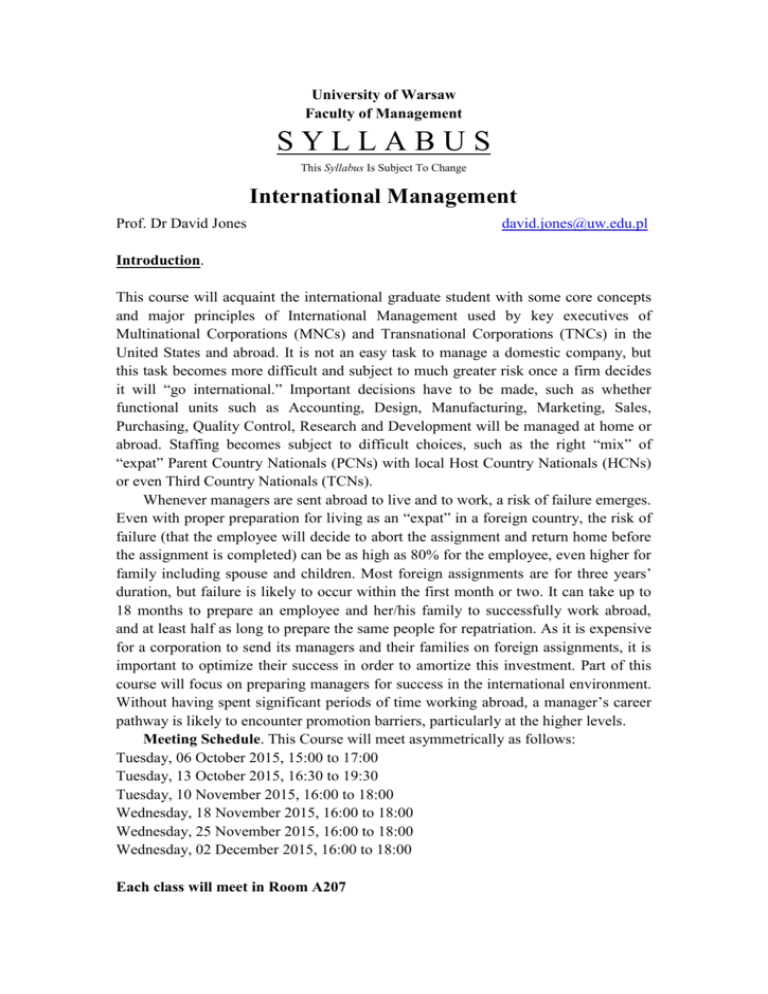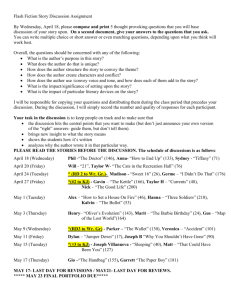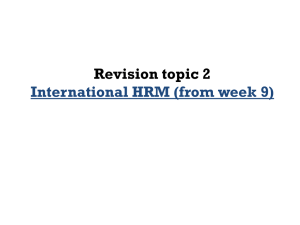
University of Warsaw
Faculty of Management
SYLLABUS
This Syllabus Is Subject To Change
International Management
Prof. Dr David Jones
david.jones@uw.edu.pl
Introduction.
This course will acquaint the international graduate student with some core concepts
and major principles of International Management used by key executives of
Multinational Corporations (MNCs) and Transnational Corporations (TNCs) in the
United States and abroad. It is not an easy task to manage a domestic company, but
this task becomes more difficult and subject to much greater risk once a firm decides
it will “go international.” Important decisions have to be made, such as whether
functional units such as Accounting, Design, Manufacturing, Marketing, Sales,
Purchasing, Quality Control, Research and Development will be managed at home or
abroad. Staffing becomes subject to difficult choices, such as the right “mix” of
“expat” Parent Country Nationals (PCNs) with local Host Country Nationals (HCNs)
or even Third Country Nationals (TCNs).
Whenever managers are sent abroad to live and to work, a risk of failure emerges.
Even with proper preparation for living as an “expat” in a foreign country, the risk of
failure (that the employee will decide to abort the assignment and return home before
the assignment is completed) can be as high as 80% for the employee, even higher for
family including spouse and children. Most foreign assignments are for three years’
duration, but failure is likely to occur within the first month or two. It can take up to
18 months to prepare an employee and her/his family to successfully work abroad,
and at least half as long to prepare the same people for repatriation. As it is expensive
for a corporation to send its managers and their families on foreign assignments, it is
important to optimize their success in order to amortize this investment. Part of this
course will focus on preparing managers for success in the international environment.
Without having spent significant periods of time working abroad, a manager’s career
pathway is likely to encounter promotion barriers, particularly at the higher levels.
Meeting Schedule. This Course will meet asymmetrically as follows:
Tuesday, 06 October 2015, 15:00 to 17:00
Tuesday, 13 October 2015, 16:30 to 19:30
Tuesday, 10 November 2015, 16:00 to 18:00
Wednesday, 18 November 2015, 16:00 to 18:00
Wednesday, 25 November 2015, 16:00 to 18:00
Wednesday, 02 December 2015, 16:00 to 18:00
Each class will meet in Room A207
Course Objectives.
Students completing this course should possess the basic knowledge and confidence
to go and live abroad and to begin to manage teams amidst workplace diversity within
a Host Country. They should understand and foresee the political, economic, legal and
technological constraints of conducting business across cultural barriers, and possess
some of the skills required to bridge cross-cultural communication gaps.
Required Book.
Helen Deresky, International Management: Managing Across Borders and Cultures.
Upper Saddle River: 7th edition 2010, Pearson Prentice Hall. ISBN 0136098673.
Student Power Point Slides for Helen Deresky, International Management: Managing
Across Borders and Cultures. Upper Saddle River: 7th edition 2010, Pearson Prentice
Hall. http://wps.prenhall.com/bp_deresky_im_7/140/35949/9203172.cw/index.html.
Recommended Readings.
David A. Jones, Four Eagles and a Dragon: Success and Failure of Quixotic
Encirclement Strategies in Foreign Policy, An Analysis. London: 2015, Bloomsbury
Publishing, Plc and New Delhi: 2015, Bloomsbury Publishing India Pvt. Ltd.
David A. Jones, "Nationalism in China: Is It Increasing? Is This Helpful?" in Burbick,
Joan and William Glass (eds.), Beyond Imagined Uniqueness: Nationalisms in
Contemporary Perspectives. Cambridge: 2010, Cambridge Scholars Publishing,
93-106.
Anne Marie Francesco and Barry Gold, International Organizational Behavior: Text,
Readings, Cases and Skills. Upper Saddle River: 2nd edition 2004, Prentice Hall.
Mary L. Connerley and Paul B. Pedersen, Leadership in a Diverse and Multicultural
Environment: Developing Awareness, Knowledge, and Skills. Thousand Oaks: 2005,
Sage Publications.
Interesting Websites:
Overseas Private Investment Corporation (OPIC). http://www.opic.gov/
World Intellectual Property Organisation (WIPO)
http://www.wipo.int/portal/index.html.en
Transparency International: The Global Coalition Against Corruption.
http://www.transparency.org/
OUTLINE:
Module One: Assessing the International Environment.
Tuesday, 06 October 2015
Deresky, Chapter 1. The Challenge.
Deresky, Chapter 2. Political, Economic, Legal and Technological Environment.
Module Two: Cross-Cultural Corporate Social Responsibility.
Tuesday, 13 October 2015
Deresky, Chapter 3. Managing Interdependence: Corporate Social Responsibility.
Deresky, Chapter 4. The Role of Culture.
Group 1 Case Analysis,.
Module Three: Communication Across Cultural Borders: Global Alliances and
Operations.
Wednesday, 10 November 2015
Note: Change of day in the week.
Deresky, Chapter 5. Communication across Culture Barriers.
Deresky, Chapter 6. Negotiation and Decision Making.
Deresky, Chapter 7. Formulating Strategy for the International Market.
Deresky, Chapter 8. Implementing Strategy: Cross-Border Alliances.
Group 2 Case Analysis.
Group 3 Case Analysis.
Module Four: Integrating Parent Country Nationals (PCNs) with Host Country
Nationals (HCNs) and Third Country Nationals (TCNs)
Wednesday, 18 November 2015
Deresky, Chapter 9. Organising Structure for a Global Operation
Deresky, Chapter 10. International Staffing: Training and Development.
Module Five: Managing An International Workforce
Wednesday, 25 November 2015
Deresky, Chaprter 11. Managing ”Expats.” Host Country Labour Relations.
Group 4 Case Analysis.
Group 5 Case Analysis.
Module Six: Motivating and Leading in an International Organisation
Wednesday, 02 December 2015
Note: This will be our Final Class except to collect Term Papers at end of
Course.
Deresky, Chapter 12. Motivating and Leading in an International Environment.
Deresky, Chapter 13. Crafting International Teams Amidst Workplace Diversity.
Group 6 Case Analysis.
Group 7 Case Analysis.
FINAL EXAMINATION
The date and time of your Final Exam, if any, or date on which your Term Paper will
be due will be announced.
Grading.
The final course grade will be based on the following criteria. Your Case Analysis
will be a Group Effort. The remaining requirements will be an Individual Effort:
50% Case Analysis from a Business Case in one of the assigned readings or online.
Note: There are 11 Comprehensive Cases provided in this edition of your book
by Helen Deresky. Depending upon course enrollment, we will divide this class
into work groups and assign to each such group one or two Cases to “brief” in the
Harvard Business School (HBS) manner:
Facts
Issues
Alternative Courses of Action: numbered, analysed
Best Course of Action: Selected by Number from List of Alternatives.
20% Final Examination
30% Term Paper of about 20 pages with proper citations and Bibliography.







